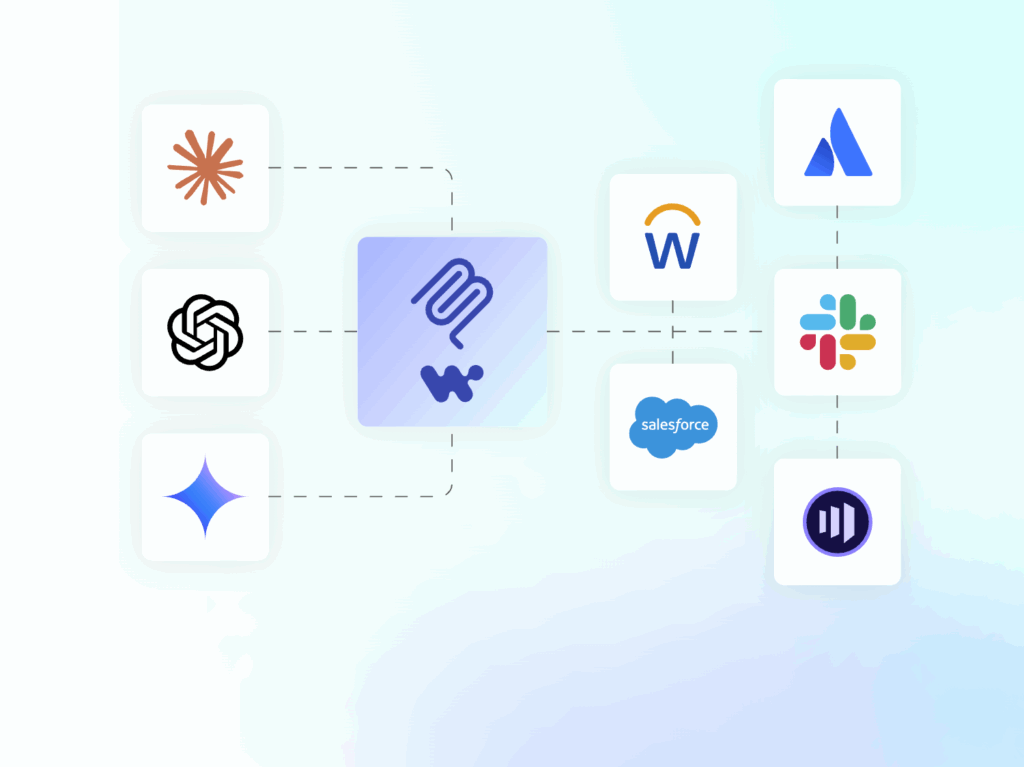The future of automation is agentic—and it needs to be governed.
The Model Context Protocol (MCP) is reshaping how AI connects to the real world. Instead of building brittle, one-off integrations between your AI agents and your business systems, MCP establishes a common language between them—securely and predictably.
But in the enterprise, “just connect it” isn’t enough. You need control. You need governance. You need to know that every action your agent takes is authorized, auditable, and reversible.
That’s where Workato Enterprise MCP stands apart.
Workato’s MCP offering builds on our proven Enterprise Automation Platform, enabling organizations to safely deploy AI agents that can interact with thousands of applications—without sacrificing compliance, scalability, or trust.
What is Workato Enterprise MCP?
Workato MCP is a secure and governed framework that allows AI models and agents to take real-world actions across your tech stack.
Instead of granting freeform access to APIs or databases, Workato MCP gives agents a controlled set of pre-defined skills—curated by your organization and executed within your Workato environment. Every AI action is predictable, logged, and compliant.
With 12,000+ supported apps and hundreds of pre-existing MCP servers, Workato delivers the industry’s largest enterprise integration surface for AI orchestration.
Why Enterprises Need a Secure MCP
Most MCP implementations focus on connectivity—getting your agent to “do” things. But the real challenge for enterprises isn’t connecting actions; it’s controlling them.
Without proper governance, an agent with open API access becomes a security liability. That’s why bare-metal MCP implementations (or open-source frameworks run in isolation) can expose sensitive data or create unpredictable automation loops.
Workato solves this by embedding security and governance into the MCP layer itself:
- Granular Access Control: Every skill an agent can invoke is defined by your organization’s admins—no arbitrary API access.
- Predictable Skills: Agents act only through pre-approved Workato recipes or connectors, ensuring traceable and auditable activity.
- Contextual Execution: Agents act “on behalf of a user,” using Workato’s authentication and role-based governance.
- Scalable, Multi-Tenant Architecture: Workato’s MCP servers are elastic, high-availability, and secure by design.
In short: Workato Enterprise MCP transforms LLM capability into enterprise-grade competence.
How Workato Enterprise MCP Works
1. Define Trusted Skills
Use Workato recipes, connectors, and roles to define the exact actions your AI agent can take. Each skill maps to a safe, auditable API interaction—no improvisation.
2. Connect to Your Model
Through Workato’s MCP interface, connect your LLM or agent framework (OpenAI, Anthropic, etc.) to your Workato instance. The model can now invoke actions securely using standard MCP schemas.
3. Govern and Observe
Every interaction runs within your governed Workato workspace—giving admins full visibility into what the agent did, when, and why.
4. Iterate in the Sandbox
Before deploying to production, experiment safely in the Workato Sandbox. Test agents, monitor API calls, and validate outputs without touching real systems.
Getting Started with Workato Enterprise MCP
The fastest way to begin is through the Workato Sandbox, a dedicated testing environment for agentic orchestration.
- Sign up for a Sandbox workspace on workato.com/sandbox.
- Connect a test AI agent (like ChatGPT and Claude) through the MCP schema.
- Grant it access to a handful of prebuilt connectors—Salesforce, Slack, Jira, ServiceNow, etc.
- Define recipes that represent trusted skills.
- Observe and audit your agent’s behavior through Workato’s built-in dashboards.
Because all actions are defined through recipes, you can trust that your agent’s capabilities stay inside enterprise-approved boundaries.
Why Workato Enterprise MCP Is Different
| Feature | Workato Enterprise MCP | Generic / Open MCP |
| Security & Governance | Enterprise-grade RBAC, audit trails, SOC2 / ISO compliance | Basic API auth or open credentials |
| Scalability | Elastic multi-tenant servers, hundreds of managed MCP nodes | Typically single-instance or self-hosted |
| App Ecosystem | 12,000+ connectors and hundreds of pre-built MCP servers | Usually limited to custom API scripts |
| Developer Experience | Recipe-based skill creation—no low-level API code | Requires manual endpoint mapping |
| Observability | Built-in logging, alerts, and dashboards | External monitoring required |
| Deployment Speed | Launch from Workato Sandbox in minutes | Manual setup and API configuration required |
Workato MCP isn’t just about giving your AI access—it’s about giving it discipline.
Real-World Use Cases
Customer Support Agents
AI assistants can triage tickets, update CRMs, and close support loops in real time—without breaching policy or data governance.
Finance and Operations Bots
Agents reconcile transactions, generate reports, and move data between ERP systems safely through approved recipes.
Sales Assistants
AI models can log meeting notes, create opportunities, or update forecasts—each action governed by defined MCP skills.
HR and IT Automation
Securely onboard employees, provision apps, and resolve requests without exposing credentials or backend systems.
The Future of Agentic Workflows
As enterprises move from static automation to agentic orchestration, MCP becomes the connective tissue that ensures trust, compliance, and control.
But not all MCPs are created equal.
Just as raw APIs needed iPaaS to scale in the enterprise, raw MCP frameworks need Workato’s layer of security, governance, and orchestration to move from demo to deployment.
Get Started
Experiment safely. Build confidently. Deploy at scale. Try the Workato Developer Sandbox today and see how easy it is to build governed, agentic workflows that your enterprise can trust. Full MCP support with remote server connectivity via Workato recipes to prototype LLM powered business processes.
Further Reading
